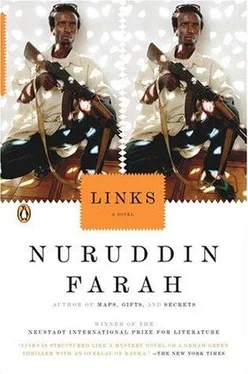“I remember that there were carvings,” Jeebleh said, “but my memory of that particular carving is vague.”
“She was a beauty,” Bile said. “She wore peacock feathers and what a train of sari colors, of a silk I’ve never seen anywhere else. I was smitten with her too, but I dared not speak of it. She was breathtakingly beautiful, irresistibly charming, her almond eyes exceptionally large and in constant motion. I can’t believe you don’t remember her. Miss Mira Meerut moved about with a large following of admirers. She was like a peacock with a harem of peahens. Until she met Seamus.”
Mira’s father, Bile related, was a diplomat based in Rome — or was he with a UN agency? In addition to her striking beauty, she was also a first-class brain. She was ready for her finals, when her parents made her withdraw from the university because she was pregnant. Bile took this personally, because he was the only person in whom Seamus had confided that he was the baby’s father. To intercede on her behalf, and ask that she be allowed at least to take her finals, Bile presented himself at Mira’s parents’ apartment. An Italian woman opened the door when he rang the bell, and told him she was the new tenant. Bile learned that Mira and her parents had left the country, precise date unknown. He found this difficult to believe, and he walked from room to room in the apartment, hoping that somehow he would find Mira or her parents. The only trace of her he discovered was a drawing of a peacock in green-and-blue blossom, with a cropped tail. Bile took ill, and barely passed his exams that year. “And guess what?” Bile asked.
“What?”
Bile faltered as he spoke. “Mira Meerut was here in Mogadiscio less than two years ago, as a UNICEF consultant. She was the mother of two children, and the happy wife of a man several years her junior, an American. She was stunningly pretty, but not as free-spirited and wide-eyed with wonder as when we met her. She had resigned herself to being the ordinary wife of an ordinary American financier, on whom she doted. And when she and Seamus met, they had a ball remembering the good times, and even enjoyed recalling the bad times, the very depressing moments. But she wasn’t at all pleased to learn from Seamus that he had left the woodcarving in storage in New York, and didn’t take it along everywhere he went.”
“How fortunate that her tour of duty here coincided with Seamus’s presence,” Jeebleh said. “I bet it was wonderful for you to see a train of saris and to relive the past.”
“She was deeply hurt, though.”
“And she didn’t hide it?”
Bile shook his head no.
“How did you figure out my dream?”
Bile said, “You may not have remembered it for what it was, because there’s a photograph of Mira, taken by Seamus, on the wall in Raasta’s room. You probably saw it before you fell asleep, and the image of this stunning woman in motion insinuated itself into your dream. She still loves Seamus!”
“It is possible that my deep unconscious also became aware of Seamus’s presence in the apartment. Maybe the dream is in part a recognition of his arrival, a welcome event.”
And suddenly Seamus was there: in full flesh, grinning.
JEEBLEH’S EYES WERE TOUCHED WITH A SMILE THAT SPREAD SIDEWAYS to his cheeks and down to his chin. Seamus’s eyes, like a falcon’s, were a dark brown, the pupils hardly visible.
Jeebleh held his breath in suspense, waiting to hear which language Seamus would speak. When they met last, in Padua, they used Italian. Would Seamus, knowing that Jeebleh had now lived in the United States for close to twenty years, choose English? In those long-gone days in Italy, the world had been in flux, but now things were very different, and they were meeting in Mogadiscio; both were keenly aware of this.
“We’re all jumpy, aren’t we?” Seamus had chosen English.
Jeebleh guessed from his tone of voice that Seamus would not lapse into some piss-elegant Irish English as he used to. He had lived in England during his teens, then had gone on to Cambridge, where he had taken his first degree. And he had spent time in Italy, France, and Egypt.
“Understandably jumpy,” Jeebleh agreed.
Seamus came closer and said, “Never you mind, we’ll sort it out.” He opened his arms wide. “But let me give you a good, warm welcome hug to comfort you!”
Seamus was a well-built, beer-drinking man. He was as tall as he was wide, and sported a liberally grown beard, the kind a devout Sikh might wear to a temple on a Guru’s remembrance day and be showily proud of. He had beady eyes, bloodshot red, and thin arms that made his wrists appear scraggy. Physically, he had changed greatly since he and Jeebleh had last met. Younger, of course, and handsomer then, he had been much leaner too, clean-shaven and with a waist that might have been the envy of many a model. But Jeebleh would have recognized him anywhere, despite his girth.
Jeebleh let go first, so as to hold his friend at a look-and-see distance, and eventually to hug him yet again, even if briefly and more for effect.
Bile, who had been standing nearby, watching the goings-on, now sneaked out of the apartment. Neither friend paid him mind.
“Mogadiscio has been awful to you!” Seamus said.
Jeebleh noted a characteristic of Seamus’s that hadn’t changed: he exploded into a room, like a missile arriving on the quiet and detonating with a rush of excitement. His entry today was not as dramatic as it used to be, and he was quieter on the whole, growing only moderately louder the more he spoke. Would he make his usual sharp, insightful comments? Jeebleh, who associated him with an impressive presence, wore a wary expression, similar to that of a dog on whose pee-marked territory a wily cat has begun to trespass.
“My clansmen have been awful.”
Seamus went to the kitchen to make coffee, and Jeebleh followed. Seamus had unkempt fingernails, edgily bitten and dirty. His toenails were long, so long they put Jeebleh in mind of a museum postcard of a Neanderthal man in all his excessive wildness, as imagined and drawn by a modern illustrator. Jeebleh guessed that his wife’s remarks about unruly toenails would have cut Seamus to the quick, and made him deal with their disorderliness. Maybe he could grow his fingernails and toenails as long as he pleased because he wasn’t sharing his life or his bed with a partner.
“Bile’s told me how they behaved, your clansmen,” Seamus said. “What a repulsive lot! Fancy asking you to pay for the repairs of their war machine. Do they think you are a warlord? They don’t know you as well as some of us think we do. But what cheek!”
“I told them off.”
“Glad you told them to sod off!” Seamus was getting a little excited, and louder. “I know how you feel. I told mine off, whingers the lot of them. I told them to naff off, the moaners. I was a little tyke then, and I haven’t lived in Ireland since, because of my family. How I hate whingers. But you want to know what I think? I think you must be careful next time you meet any of them, if there is a next time. They’ll stick a knife in your back, easy as taking a toffee from a baby. They’re all plunderers, every single one of them. But then, you know that, don’t you?”
“I do!” Jeebleh agreed.
“And they bury you fast here,” Seamus said.
“Don’t worry. I won’t let them.”
“Good for you!”
“I refuse to die. My family wouldn’t want me buried here. My wife is an American, you know, and calls this place ‘a jerkwater of a ruin.’ I’ve other responsibilities elsewhere, a loving family to love.”
“Glad to hear it.”
There was a brief pause.
Jeebleh said, “It’s lovely to see you.”
Читать дальше












